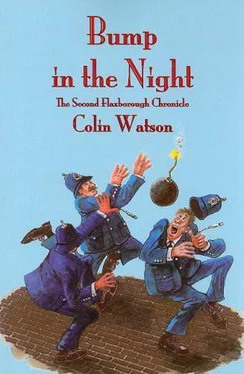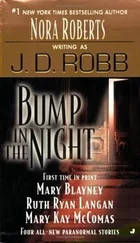“He didn’t, as a matter of fact.”
“Oh!”
“He merely tried, in the clumsiest possible manner, to persuade me to condemn myself out of my own mouth.”
Worple shook his head sadly. “I do wish he wouldn’t take that line, sir. He doesn’t mean to be offensive, but people aren’t to know that.”
“It must be very trying for you, sergeant.”
“I wouldn’t say that exactly, sir. It’s just that I don’t like to see policemen getting a name for being unintelligent. Not all of us are stupid, you know.”
As if to prove this contention, Worple scraped his thumbnail over a portion of the framework and prised off a sticky fragment. “Adhesive tape,” he remarked. “Now the forensic people could probably tell us a lot from that.”
“Really?”
“Oh, yes. Where it was made. What batch it was in. Name of the chemist it was sent to. When. All that. Yes.” He looked a little longer at the piece of tape, then rolled it into a ball between finger and thumb and flicked it away.
“Should you have done that?” inquired Hoole.
“The chief would never bother with it, sir. He takes a very straightforward attitude.”
“He spurns empiricism?” ventured the optician.
“Mr Larch spurns everything, sir.”
The sergeant put an arm through his load of scrap brass and slung it to his shoulder. He opened the shop door and looked up at the bracket from which the sign had been suspended.
“There’s something I find a bit puzzling,” said Worple. “I had to borrow a pair of steps to fetch this thing down. It must have been, oh, eight or nine feet above the pavement. Now how do you reckon our chap reached it?”
“Reached it?”
“To stick his bomb on it, sir. You saw me indicate a piece of adhesive tape. Adhere means to stick. That’s how it was done, you know.”
“A tall gentleman perhaps?”
Worple shook his head. “An ingenious theory, sir, but I can’t call to mind anyone hereabouts who’s over seven feet tall.”
“True.”
The sergeant considered the bracket a little longer, then asked: “Do you happen to know who occupies the premises immediately above your shop, sir?”
“Of course. They’re mine.”
“Somebody could have reached over from that window.”
“I suppose he could—provided he had first got into my consulting room.”
“Would that have been possible, sir?”
“Perfectly. The place isn’t burglar-proof. There’s a door and a window at the back. Probably open now. I don’t know.”
Worple looked at Hoole reprovingly. “Might I take a look at them?”
Amidst the anarchy of the optician’s back room, the sergeant examined what was visible of the door and the window behind piles of cartons and loose packing. He reported that neither was fastened.
“Very insecure premises, if I may say so, Mr Hoole.”
“Yes, but who would want to pinch a set of sight-testing charts, my dear fellow?”
Worple pondered this briefly.
“Perhaps another optician, sir? One not quite so well established.”
Chapter Eight
Reluctantly, Mr Grope admitted to Mr Kebble that Outrage Three had foxed him.
“There’s no rhyme or reason in it,” he complained. “Now if that Hoole man were Temperance...” Grope gloomily wagged his head. “He’s not even on the bench.”
“There go both your theories then, Walter. Hard lines, old chap.” Kebble voiced his sympathy with a briskness that Grope found distasteful. “It’s all very well for you,” he grumbled. “Newspapers aren’t concerned with right and wrong. But I like to get the moral flavour settled.”
“Nothing moral about blowing things up, surely?”
“You can’t tell for certain. That memorial and the statue, now: I’d have said those affairs were downright wicked. But now the wind’s changed a bit, as you might say. The eye-glass fellow’s a rum character. The police are over at his place now. Did you know?”
“Yes, I sent Harry across to get a picture. Oh, by the way...” The editor turned and reached down a filing tray marked ‘MEMS’. He selected a sheet of paper which he passed to Grope. “Poetry’s your department, Walter. What do you make of that?”
Grope held the paper at arm’s length, tucked in his chin and focused down the line of his nose as if taking aim along a harpoon. He read slowly and aloud:
In Memoriam. July 1st
The thirst that from the soul doth rise
Doth ask a drink divine;
There’ll be that dark parade
Of tassels and of coaches soon—
It’s easy as a sign...
“Well,” said Kebble, “does that mean anything to you?”
“No. Except that it’s not proper poetry and it doesn’t seem right for an ‘In Memoriam’.”
“You only think that because it’s not one of yours. Walter.”
There was some justice in Kebble’s taunt. Mr Grope naturally resented trespass upon those local fields of poesy he had made his own. One was the souvenir trade. The other was the ‘Mems’ section of the Chalmsbury Chronicle’s small advertisement pages.
Each week there appeared some three columns of rhymed manifestos commemorative of deaths in previous years. A regular reader of these would soon have detected that most of them consisted of permutations of a limited number of standard couplets. Thus, in a single issue the lament: ‘ Oh, Father dear, you’re missed by all; e’en though your picture’s on the wall ’ might appear five or six times. But whereas in one case it would be followed by ‘ We never heard you say goodbye; but you had gone, and God knows why ,’ another panegyric would proceed with ‘ You’d had enough, you needed rest; so never mind, you were one of the best .’
The reason for identical sentiments being expressed in relation to so many totally unconnected passings was that Mr Grope had been commissioned by the newspaper to produce a once-and-for-all selection of about thirty couplets to cover every contingency. These were numbered and set out in black-bordered leaflets that incorporated an order form (‘mark lines required here’) and were posted, like wireless licence reminders, to every household shown by the advertising manager’s records to have suffered a death twelve, twenty-four, or thirty-six months previously. A four-year lack of response won subsequent immunity from canvass.
Most of the bereaved, in fact, were eagerly responsive. Mr Grope’s epitaphs were widely admired and a certain social distinction attached to the public proclamation of grief. Indeed, an element of competition had crept into the business. To commission a shorter ‘In Memoriam’ than a rival relative meant loss of face. The fear that Sister Edie and Family would spread themselves to ten lines prompted Brother Fred and All at Number Seven to order twelve. Then, quietly appraised of this state of affairs by the advertising manager, Daughter Marjorie and Little Norman would top the family score with fourteen.
Grope read again the message that compared so miserably with his own round, explicit verse.
“ ‘Drink divine’,” he repeated. “Sounds more like a brewer’s advertisement. You aren’t going to print it, are you?”
“Naturally. It’s paid for.”
“Who brought it in?”
“Nobody. It came this morning by post. No name or address, but there was a postal order. We don’t usually take them unless they’re signed, but this seems harmless enough. I just wanted to know if you knew the quotation. We don’t want to risk any double meanings.”
Grope tried hard to discover some undertone that would disqualify the blackleg rhymster but failed. He said again that he thought the piece inappropriate. Then something stirred in his memory. “And I think I know why,” he added quickly. “I believe it’s out of some song or other. That’s where I’ve heard it.”
Читать дальше












